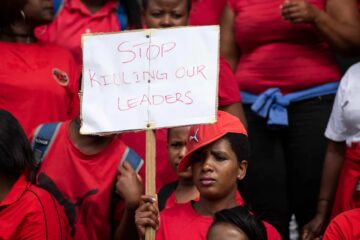S’bu Zikode and Richard Pithouse in the Boston Review:
 Richard Pithouse: Mandela was released from prison on February 11, 1990, suddenly opening up the field of political possibility after a long and exhausting stalemate between the progressive forces, which were largely organized in two groups: the United Democratic Front (UDF) and the trade unions, and the apartheid state. What did Mandela’s release mean to you?
Richard Pithouse: Mandela was released from prison on February 11, 1990, suddenly opening up the field of political possibility after a long and exhausting stalemate between the progressive forces, which were largely organized in two groups: the United Democratic Front (UDF) and the trade unions, and the apartheid state. What did Mandela’s release mean to you?
S’bu Zikode: I was fourteen years old, and in school. At that time, we were divided. It was the time of the war between [the right-wing Zulu nationalist organization] Inkatha and the UDF. People could easily draw the line between the two sides along a river or a road. Everyone on one side was Inkatha; everyone on the other side was UDF. A lot of people were killed or had their homes burnt down just because they were living on this or that side of the line.
Some people had guns; we young people had sticks. If you turned back from a battle you would be shot. You had to face bullets from the front and the back. Terrible things happened, very painful things. We don’t talk about it.
More here.
